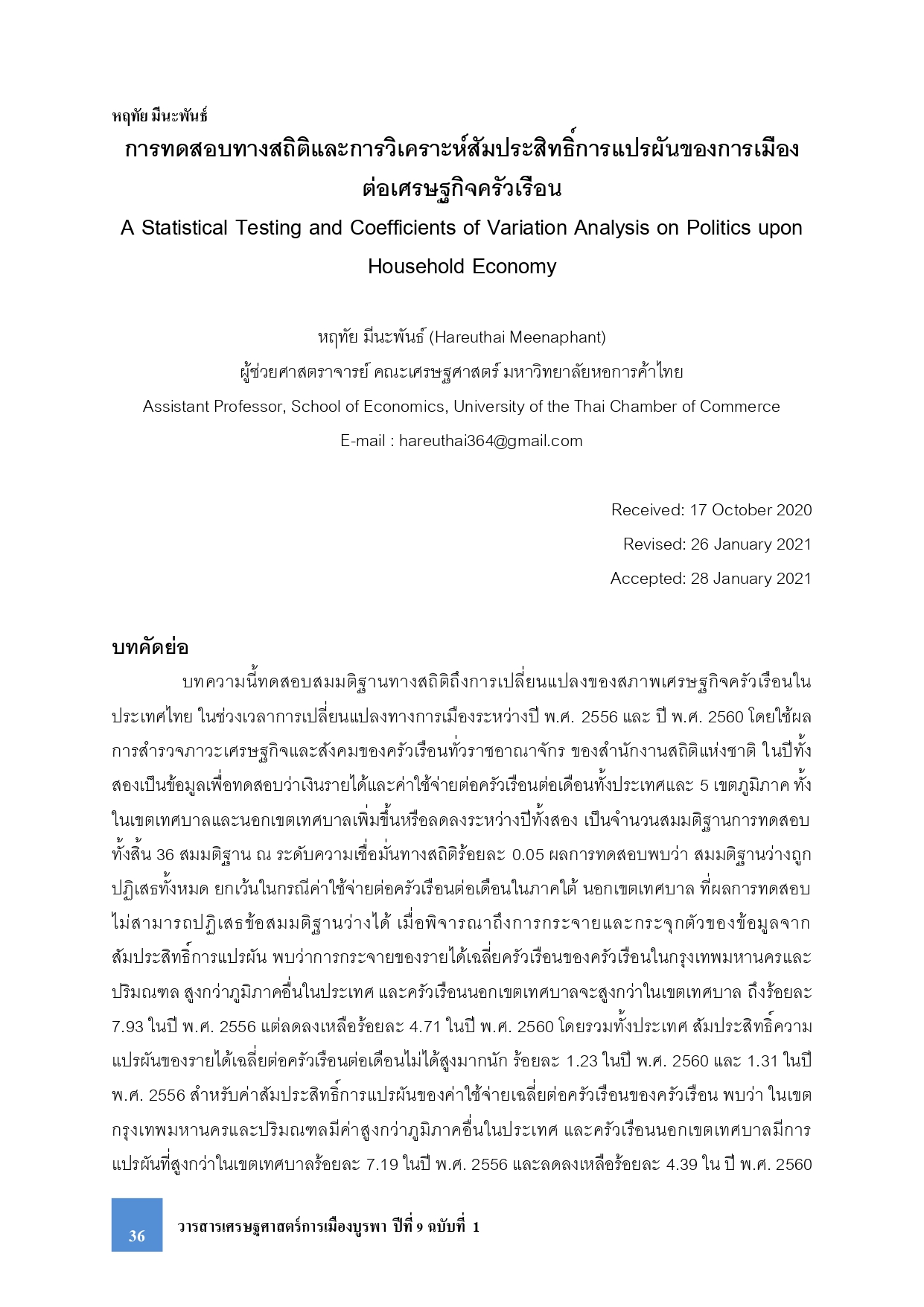A Statistical Testing and Coefficients of Variation Analysis on Politics upon Household Economy
Keywords:
Political Changes, Average Household Income Per Month, , Average Household Expenditure Per Month, Statistical Hypothesis Testing, Coefficients of VariationAbstract
This article aims to present a statistical hypothesis test on the changes in household economic condition in ThailandBy making use of available Household Socio-Economic Survey for Whole Kingdom conducted by National Statistical Office in 2013 and 2017, the hypothesis testing was performed on the survey’s estimated monthly income and expenditure per household for the whole kingdom and 5 regions in both municipal and non-municipal areas. Altogether there were 36 hypotheses tested with the confidence level of 0.5. Testing results found null hypotheses were all rejected but one accepted, that the estimated household’s income and expenditure per month in the survey were statistically accepted at the 0.05 significant level. The only region that the null hypothesis could not be rejected, t-statistic value 0.3523 and p-statistic value 0.3623, was the household expenditure in the South’s non-municipal area that its estimated household’s expenditure in year 2017 was not higher than in year 2013. In addition, the coefficients of variation (CV) were calculated for all regions and the whole kingdom in municipal and non-municipal areas. It found that CVs of household’s income in Greater Bangkok and non-municipal areas were higher than any other regions in the country. Greater Bangkok’s CV was 7.93 percent in 2013 and 4.71 percent in 2017. For the whole kingdom, CV was not that high, 1.23 percent in 2017 and 1.31 percent in 2013. On the household’s expenditure side, Greater Bangkok’s CV remained higher than other regions, 7.19 percent in 2017 and 4.39 percent in 2013. For the whole kingdom, CVs on expenditures did not change in both year, 0.87 percent and 0.89 percent, respectively. Thus, when compared with the income CVs, the distribution of household’s expenditures were more concentrated and less dispersion.
References
สำนักงานสถิติแห่งชาติ. การสำรวจภาวะเศรษฐกิจและสังคมของครัวเรือนในปี พ.ศ. 2556 และ พ.ศ. 2560. สำนักงานสถิติแห่งชาติ กระทรวงดิจิตัลเพื่อเศรษฐกิจและสังคม.
หฤทัย มีนะพันธ์. (2562). “การวิเคราะห์เปรียบเทียบการเปลี่ยนแปลงสภาพเศรษฐกิจครัวเรือนในช่วงที่มีการเปลี่ยนแปลงทางการเมือง” วารสารสถาบันพระปกเกล้า, 17(2), 55–76.
ภาษาอังกฤษ
Acemoglu, Daron, Surresh Naidu, Pascual Restrepo, and James A. Robinson. (2019). “Democracy Does Cause Growth.” Journal of Political Economy, 127(1), 47-100.
Barro, Robert J. (1991). “Economic Growth in a Cross Section of Countries.” Quarterly Journal of Economics, 106(2), 407-443.
Barro, Robert J. (1996). “Democracy and Growth.” Journal of Economic Growth, 1 – 27.






